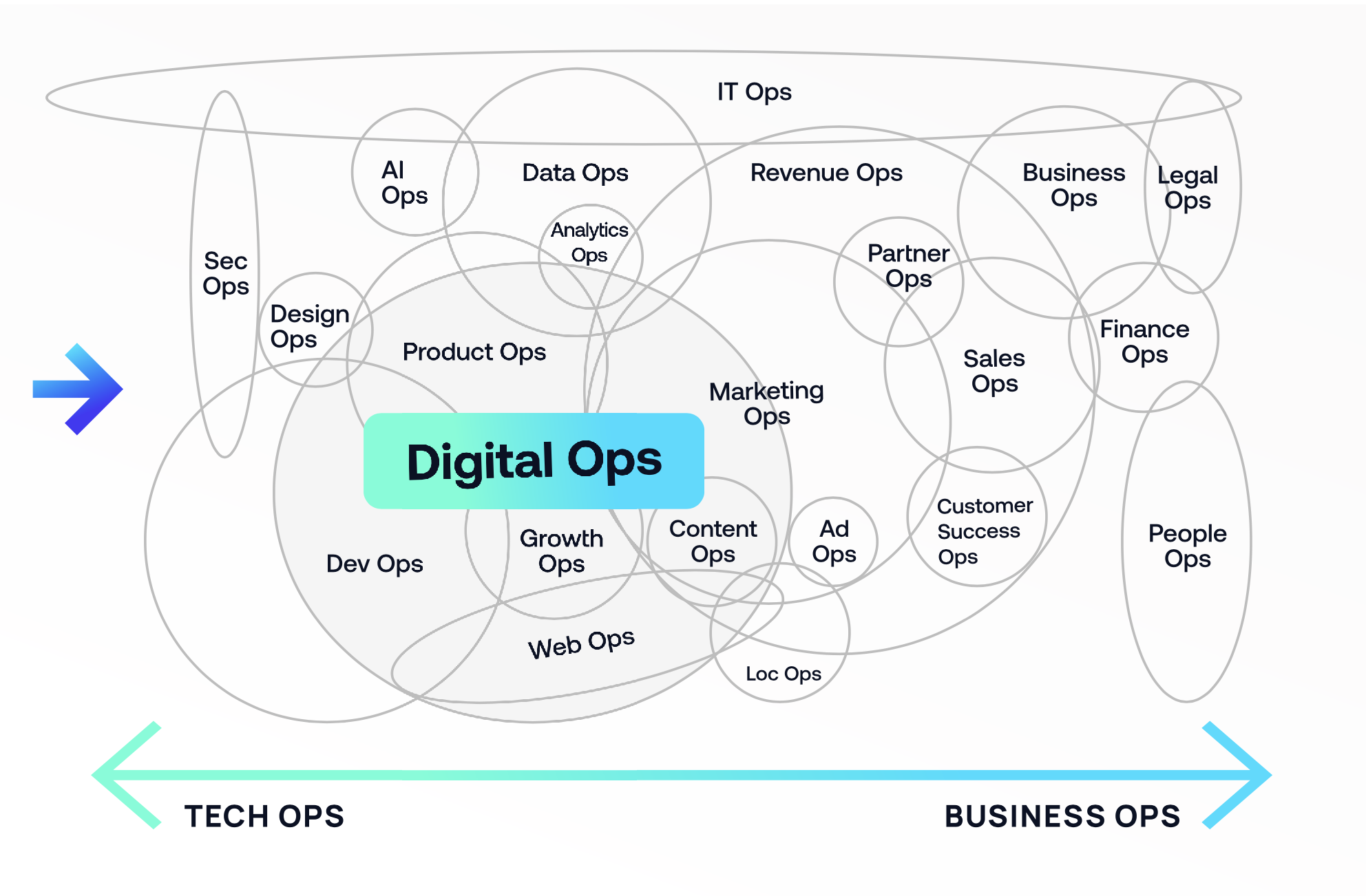Maintaining exceptional website health — that is, the underlying foundations of technical SEO that can drive real results from organic search — requires collaboration across multiple teams and individuals. Shifting from more siloed operational approaches to a broader Digital Ops vision can help create new efficiencies, better SEO execution, and build deeper business-wide insights into your site’s revenue-driving impact.
For digital marketers, organic channels (like organic search) are becoming increasingly important as paid channels are facing new challenges from increased privacy demands and the decline of third-party cookies. As more marketing teams focus on SEO, it’s important to support these efforts with a strong operational framework. But marketing siloes are breaking down — our work is more cross-functional than ever and our purview and need for collaboration across teams and departments are expanding beyond the limits of traditional Marketing Ops structures.
To really take your website-driven organic marketing efforts to the next level and create greater business impact in the search-first age, it may be time to expand your operational vision from Marketing Ops into the more comprehensive landscape of Digital Ops.
This is an excerpt from Lumar’s latest eBook, “How to Make Your Website a Performance Multiplier for Demand Generation”. Download the full eBook for an in-depth look at how your website influences demand generation—and how building out a robust Digital Ops structure within your organization can help support these efforts.
Website health & organic search touch more operational categories than you might think…
For most organizations, website projects do not sit solely within the realm of Marketing Ops. Optimizing your website for organic search frequently involves product, engineering, design, content, UX, and growth teams working in close collaboration. When those disparate teams work in siloes and don’t have convenient tools and practices in place to share knowledge and manage website projects collaboratively, it can take ages for necessary website changes to be made. Without collaborative Digital Ops resources in place to execute on SEO projects, it can be easy to fall behind in search and miss out on significant brand awareness and conversion opportunities.
This is why businesses should consider building out broader Digital Ops practices that can empower website teams to collaborate and do their best work — regardless of which department they sit in. Taking a cross-functional Digital Ops perspective (rather than limiting your operational approach to individual departments) can help these teams work together and ensure they collectively have the resources and data required to efficiently address website health and search engine optimization issues.
Your website is a powerful part of your marketing mix — and it’s a shared responsibility.

Maintaining a technically healthy website is crucial for succeeding in organic search. With last year’s Core Web Vitals updates emphasizing user experience, it’s clear that SEO today is about much more than keywords — UX, site speed, and technical SEO have a major role to play in organic search success. To give your site’s technical health the attention it requires, it has to be baked into your wider operational planning. But historically, businesses have often overlooked and under-invested in SEO. It can be neglected by marketing, product, and tech teams alike — particularly when no one is entirely sure which team within the business should really ‘own’ website health and SEO.
The truth is, it’s a shared responsibility. Anna Poczik, a product manager at Artsy, summed this up nicely: “Anyone who puts anything on your website is responsible for SEO.”
Enabling better cross-functional and cross-departmental collaboration is key for businesses that want to build more efficient and effective SEO practices (and ultimately, drive more brand awareness and conversions from organic search). Organizations can begin by building out a Digital Ops framework that is inclusive of all teams who work on the website.
The operational & executional challenges involved in SEO & website health
When digital teams are operating in relative isolation from one another and do not have the operational structures in place to collaborate effectively or efficiently, it’s harder to get things fixed on your website quickly—or at all. The operational challenges involved in addressing SEO and website health in a timely and impactful manner are often the result of digital teams working in overly siloed structures, without shared knowledge or a shared vision of their intertwined responsibilities and goals.
In a recent survey we conducted of 200+ digital leaders, 60% of respondents said one of the most pressing SEO challenges they faced was executing SEO improvements at scale across large websites. And 53% cited “managing SEO tasks across multiple departments” as a core challenge within their organizations. This suggests that executional and operational hurdles are significant pain points for digital teams aiming to improve their SEO. Expanding your operational view from Marketing Ops into Digital Ops and putting the people, platforms, and practices in place to support this diverse work can help break down siloes and create more seamless workflows to execute your website health and organic search efforts.
How to improve Digital Ops within your organization & better support cross-functional website teams
What can you do to build out a stronger Digital Ops function within your organization? We’ve compiled a list of 5 key suggestions to get you started.
1. Educate yourself, your leadership team, and your board about the needle-moving impact of website health and organic search.
Get the support you need from leadership by promoting SEO and organic search KPIs as business-wide OKRs — and not just in marketing or search-related terms. There is great information out there about the impact that SEO can have as a comparatively low-cost customer acquisition channel and about the ROI of SEO. Frame your discussions with business leaders in commercial terms to show the wider influence at play.
2. Establish a Digital Ops task force and integrate website analytics and search data into your Business Intelligence toolkit.
Establish a cross-functional Digital Ops task force that spans every department it touches (marketing, product, development, UX, QA, etc.). In our experience, the insights regularly being generated by SEOs are rarely utilized to their full potential. This is in part due to SEO not being seen as a business-wide priority — and as a result, being siloed and under-utilized. We recommend pulling in teams from across the organization.
Businesses that are able to implement wider “digital operations” systems and practices that connect the full range of website-related activities happening across different teams will have a powerful advantage. They’ll increase both their ability to understand what the data is telling them and their ability to take action. And they will have a wider range of stakeholders in the room to positively influence outcomes.
3. Prioritize and invest in search as a key organic marketing channel.
Allocate the appropriate resources to support website health and SEO projects (including budget, people, platforms, and time). Give the team the technology needed to succeed with both content development & technical SEO. Make sure you’ve invested in platforms with robust website analytics features — without the data to know where you are currently, you’ll have no way to monitor improvements and track meaningful traffic and revenue results over time.
4. Give your SEO experts a bigger voice at the decision-making table
As search is becoming an increasingly important driver for brand awareness and revenue, it’s time to empower the experts who will drive your strategy forward. Give them a seat at the leadership table and make sure they’re represented in relevant decision-making and strategy development sessions. These experts can help businesses make critical decisions within the Digital Ops domain and ensure website health and search strategies are prioritized across the wider organization.
5. Enhance your ability to execute by utilizing SEO automation
Marketing automation is familiar to most of us these days, but fewer digital leaders are aware that similarly, time-saving solutions exist for SEO automation. Using automation for SEO can provide a major boon to your cross-functional Digital Ops teams. That’s because SEO automation solutions are built to enhance collaboration and reduce the risks associated with website updates. Site updates, as we’ve discussed, can often be complicated due to the number of people involved in making changes. With automated SEO QA testing you can ensure that any new website code deployments have been automatically checked for SEO- related errors and avoid introducing mistakes that could negatively impact your search rankings, user experience, traffic, and revenue.
Until very recently, automation platforms didn’t exist for SEO purposes. Teams involved with SEO were spending far too much time chasing after website errors that had already gone live and negatively impacted their search efforts. Seeing this happen, again and again, our team at Lumar decided to build new automation solutions for SEO. Today, SEO automation is used by teams across the Digital Ops space and introduces new efficiencies and risk mitigation for everyone involved.
As organic search increasingly contributes to brand awareness and revenue generation efforts, it pays to take a more proactive approach. Businesses can avoid losses in visibility, traffic, and search-driven revenue by taking advantage of new automation technology and preventing these issues from going live on their sites in the first place.
For more on Digital Ops and SEO project management best practices, check out the full eBook: How to Make Your Website a Performance Multiplier for Demand Generation.





